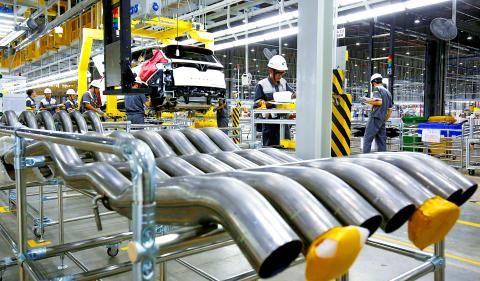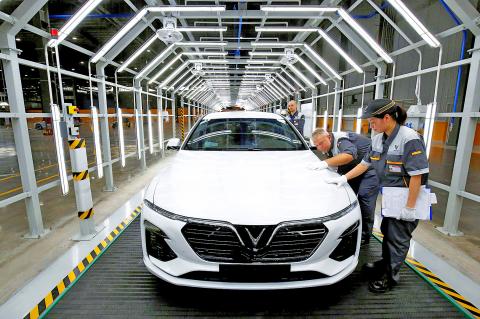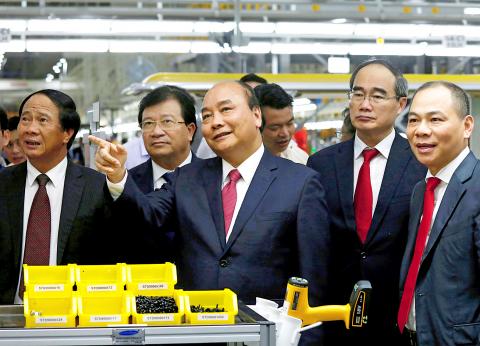Vietnam is getting into the car business with its own brand.
Real-estate conglomerate Vingroup JSC’s auto unit VinFast yesterday marked the rollout of its first vehicles from its assembly line, embodying the aspirations of the fast-developing country’s government to build a modern manufacturing sector.
“This makes a great contribution to the national economy,” Vietnamese Prime Minister Nguyen Xuan Phuc said in a speech during a ceremony at VinFast’s complex of six automated factories constructed in 21 months in the northern port city of Haiphong. “It affirms the [Vietnamese] Communist Party’s policy that the private sector is a very important driver of the economy. I want VinFast to go to the regional and global markets.”

Photo: Reuters
VinFast, which is to start delivering cars to customers on Monday, wants to be the first Vietnamese company to succeed at challenging foreign competitors such as Toyota Motor Corp, Ford Motor Co and Honda Motor Co in one of the world’s fastest-growing economies.
Xuan Kien Automobile, known as Vinaxuki, failed to win over brand-conscious Vietnamese with its local car models before folding in 2015.
The first VinFast rollout, a hatchback named Fadil, is initially priced at 394.5 million dong (US$16,900).

Photo: Reuters
Vingroup said in 2017 that it planned to invest up to US$3.5 billion in its auto business.
The company is also producing sedans, sport utility vehicles and electric motorbikes.
However, the company faces challenges in Vietnam’s aspirational culture.

Photo: Reuters
“Product quality is a concern” among consumers, said Truc Pham, a senior analyst at ACB Securities JSC in Ho Chi Minh City. “Vietnamese people favor foreign brands for high-value products. It will take years for customers to accept a new local brand.”
VinFast plans to make 250,000 vehicles during a first stage of operations, with projected production increasing to 500,000 vehicles a year by 2025.
The company said last year that it expects to begin exports in the middle of next year.
VinFast said it received 10,000 vehicle pre-orders a year ago.
Vietnamese purchased 119,497 new vehicles in the first five months of the year, an 18 percent jump from the year-earlier period, according to the Vietnam Automobile Manufacturers’ Association.
The vehicles are not completely made in Vietnam. The Fadil uses the chassis of the Karl Rocks model by PSA Group’s Opel. The sedan and SUV are built on frames from BMW AG, designed by Italian design house Pininfarina and have components engineered by Magna Steyr.
Jim Deluca, the former vice president of global manufacturing for General Motors Co, was hired as VinFast’s chief executive officer.
Vingroup embraced the government’s aspirations to see domestic manufacturers make high-value products for the nation’s growing middle class in an economy that has expanded at an average rate of 6.6 percent since 2000 — boosting annual incomes to almost US$2,600 from about US$400.

CHIP WAR: Tariffs on Taiwanese chips would prompt companies to move their factories, but not necessarily to the US, unleashing a ‘global cross-sector tariff war’ US President Donald Trump would “shoot himself in the foot” if he follows through on his recent pledge to impose higher tariffs on Taiwanese and other foreign semiconductors entering the US, analysts said. Trump’s plans to raise tariffs on chips manufactured in Taiwan to as high as 100 percent would backfire, macroeconomist Henry Wu (吳嘉隆) said. He would “shoot himself in the foot,” Wu said on Saturday, as such economic measures would lead Taiwanese chip suppliers to pass on additional costs to their US clients and consumers, and ultimately cause another wave of inflation. Trump has claimed that Taiwan took up to

A start-up in Mexico is trying to help get a handle on one coastal city’s plastic waste problem by converting it into gasoline, diesel and other fuels. With less than 10 percent of the world’s plastics being recycled, Petgas’ idea is that rather than letting discarded plastic become waste, it can become productive again as fuel. Petgas developed a machine in the port city of Boca del Rio that uses pyrolysis, a thermodynamic process that heats plastics in the absence of oxygen, breaking it down to produce gasoline, diesel, kerosene, paraffin and coke. Petgas chief technology officer Carlos Parraguirre Diaz said that in

SUPPORT: The government said it would help firms deal with supply disruptions, after Trump signed orders imposing tariffs of 25 percent on imports from Canada and Mexico The government pledged to help companies with operations in Mexico, such as iPhone assembler Hon Hai Precision Industry Co (鴻海精密), also known as Foxconn Technology Group (富士康科技集團), shift production lines and investment if needed to deal with higher US tariffs. The Ministry of Economic Affairs yesterday announced measures to help local firms cope with the US tariff increases on Canada, Mexico, China and other potential areas. The ministry said that it would establish an investment and trade service center in the US to help Taiwanese firms assess the investment environment in different US states, plan supply chain relocation strategies and

Japan intends to closely monitor the impact on its currency of US President Donald Trump’s new tariffs and is worried about the international fallout from the trade imposts, Japanese Minister of Finance Katsunobu Kato said. “We need to carefully see how the exchange rate and other factors will be affected and what form US monetary policy will take in the future,” Kato said yesterday in an interview with Fuji Television. Japan is very concerned about how the tariffs might impact the global economy, he added. Kato spoke as nations and firms brace for potential repercussions after Trump unleashed the first salvo of